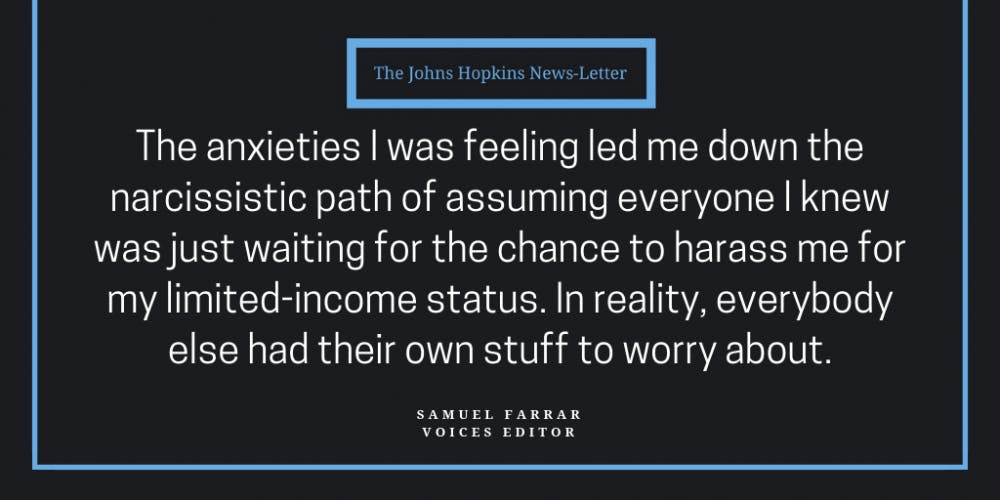No matter where you go, or who you are, the beginning of a college career is always filled with anxiety. Am I smart enough to be here? Will people like me here? Did I make the right choice? These are ideas going through everyone’s heads, and for the most part, we are all aware of how they can shape our acclimation to Hopkins.
However, there are other sets of anxieties that are not so universal. Although all are equally valid, someone from the other side of Baltimore will have different anxieties to someone coming from the other coast, and those will both be vastly different from someone coming from the other side of the planet. Our family, social and educational experiences all shape the way we approach a change as big as this.
For me, my individual anxieties centered around the fact that I come from a single parent, limited-income family. Everybody knows Hopkins is an extremely high income environment. According to a New York Times article on economic diversity at Hopkins, the median income for a student’s family here is almost $180,000. That’s over three times the national average. I’ve heard stories of people having discussions about how poor they were because their house was only worth one million dollars, while all their friends had multi-million dollar homes.
Of course, scenarios like this are certainly not the majority, but it does go to show how wide the spread of wealth is at Hopkins, and how heavily it skews to the top quintile. In the beginning of my Hopkins career, these facts intimidated me. However, as I’ve grown, I’ve not only learned how to mitigate the challenges I face as a limited-income student, but how to use that identity as a way to enhance my own personal growth.
One of the privileges — and disadvantages — of this identity, is that it is almost invisible. Sure, someone could catch on that half of my clothes come from Walmart, or connect the fact that I’m growing my hair out with my inability to justify spending $20 on a haircut. But in reality, if anyone judges me for how I present myself, their conclusion is much more likely to be that I just have no taste (which is extremely true).
This is one of the first lessons I learned coming to campus; no matter what tax bracket you are in, you can always be unfashionable.
In regards to invisibility, what really came to bother me was the social sphere. I immediately noticed how many people were talking about their trips to Europe or Asia, or even wide across the States. Meanwhile, the farthest north I had ever travelled was to Towson Town Center (I grew up in North Carolina). Moreover, people on campus spend at a rate I simply couldn’t keep up with, despite definitely feeling a pressure to. In my mind, eating out for lunch, going to the Inner Harbor for dinner and taking a day trip the day after were crucial friend-building experiences. I felt left out of it. It seemed as if invisibility was destined to become my central identity during my four years.
It is easy to feel powerless in these situations, but in reality you hold just as much power as anyone else. Wealth is no barrier to true friendship; all those activities that often structure socializing are not done in the name of burning money. You have the power to set the agenda.
Here’s what I did. The second night of orientation week just so happened to be the night of the Conor McGregor and Floyd Mayweather fight, one of the biggest boxing matches of the 21st century. Now, I know essentially nothing about boxing, but everyone plugged into the sports world in some fashion knew about the magnitude of this fight. I figured I have a screen on my desk and ways to stream that are cost effective, so why not do something?
That day I invited just about every person I saw, and by the time the fight began there were 20 people squeezed into my AMR I dorm. We had a blast, we got to know each other a bit and I’m still close friends with many of them today.
Of course, these kinds of anxieties don’t end the second you make a friend or two. One of the hardest things about coming in as a limited-income student is the fact that you likely come from a limited-income school system as well. In my freshman spring, I had to take Calculus I, and I was extremely embarrassed about it. At most schools this would be normal, but to me it seemed like it was standard to test out of it and go straight into Calculus II. When I told my friends, a joke or two came at my expense. But a few weeks into the course, when I first went to the same friends to ask for help, they had no idea I was taking it. That’s when I realized this was going to be the only time I was ever going to be comforted by the fact that nobody cares about what I’m doing. The anxieties I was feeling led me down the narcissistic path of assuming everyone I knew was just waiting for the chance to harass me for my limited-income status. In reality, everybody else had their own stuff to worry about.
There’s no magic moment where you overcome these anxieties. Coming to Hopkins I was looking to expedite the process of adjusting to college so that I could experience the rest of my time here in peace. There’s no dichotomy between adjusting and being adjusted. In reality, it’s an ongoing process of personal growth. I was forced to overcome these challenges so that I would be prepared to face any future obstacles in life. What is the point of college if not that?

















